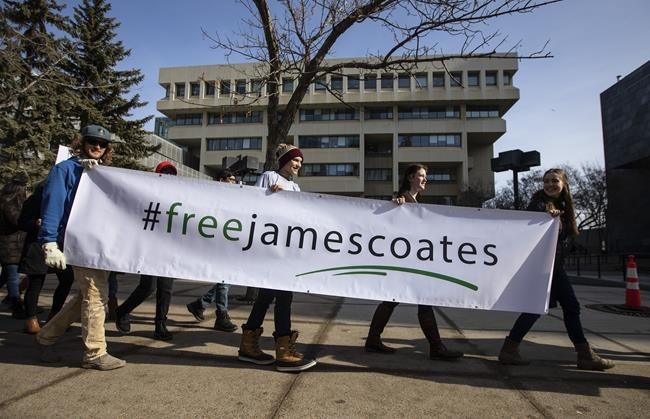Pandemic-era public health charges have been dropped against an Edmonton-area pastor and church, as well as a central Alberta man who hosted a rodeo in protest of COVID-19 restrictions.
GraceLife Church pastor James Coates had been cited for violating public health orders by holding church services without following the gathering limits imposed by the provincial government.
However, Crown prosecutors say they had to quash the case against Coates and GraceLife after another court decision last month found the Alberta government under then-United Conservative premier Jason Kenney had improperly imposed the orders under the Public Health Act.
In that decision, the court found Dr. Deena Hinshaw, who was the provincial chief medical officer of health at the time, had not made the decision to impose the public health orders, instead leaving it up to cabinet of the Alberta government.
The case involved Calgary gym owner Rebecca Ingram and several others, who challenged public health orders on constitutional grounds and on claims that the orders were beyond the authority of the province's Public Health Act.
The judge in the Ingram case found the orders would have been constitutional had they been properly enacted by Hinshaw.
The Alberta Crown Prosecution Service said in a written statement that the Ingram decision made other cases, such as those involving Coates and anti-lockdown rodeo organizer Ty Northcott, unlikely to succeed.
"The Alberta Crown Prosecution Service reviewed the decision in Ingram v. Alberta and concluded there was no longer a reasonable likelihood of conviction in relation to Public Health Act charges involving the contravention of the disputed orders from the chief medical officer of health," the statement said.
"Where necessary, the Alberta Crown Prosecution Service will apply to the Alberta Court of King's Bench for an order quashing the convictions on charges of contravening the COVID-related public health orders."
The province's Public Health Act doesn't allow those decisions to be made by politicians, and the Alberta Court of King's Bench ruled them invalid.
An Alberta court spokesman confirmed Thursday that charges have also been stayed against Northcott, whose family hosted a "No More Lockdowns Rodeo Rally" near Bowden, Alta., in May 2021.
John Carpay, president of the Justice Centre for Constitutional Freedoms, said Thursday that the Ingram decision was a "mixed result."
"The court ruling is good in the sense that it invalidates the measures and it brings an end to these prosecutions."
However, Carpay said the judge didn't delve into the "harms and benefits" of pandemic-era "lockdowns," and concluded that any Charter violations arising from the public health orders were justified.
"I've disagreed with her very publicly since the ruling was released," he said.
Lorian Hardcastle, an assistant professor specializing in health policy and law at the University of Calgary, said the dropping of pandemic-era charges against Coates and others was not unexpected, but frustrating.
"This church flagrantly disregarded the COVID rules and did so in a very public manner that encouraged others to break the rules," she said. "What we're seeing is all of this money that's been poured into these cases, all of the judicial resources that have been used on these cases is for naught because they're being dismissed."
Hardcastle said the Kenney government could have easily followed the proper process set out in the Public Health Act, or amended it to bring the orders into compliance.
She said it was repeatedly pointed out to the government by her and others that the orders weren't being properly imposed.
"They had to have known that they weren't following those legislative processes," she said. "And, of course, it also sends this message. It's been emboldening these groups who are anti-vax, anti-COVID-measures, anti-other-public-health-measures and they're being emboldened by these rulings and declaring these as a victory for them when really it's just a technicality."
Hardcastle said the Alberta government at the time would take credit for public health decisions when things were going well, but would defer to Hinshaw "when it was convenient."
"When things were going more poorly, sometimes they would thrust her into the spotlight and say, 'well, these are her recommendations,'" Hardcastle said. "So having it be unclear at times who is making decisions and who had the power to make decisions, I think served them politically.
"They very much threw her under the bus."
The Alberta Justice Ministry said in a statement that the "Alberta government is looking into what the Ingram v. Alberta decision means in relation to the Public Health Act, and in time will determine the best path forward."
This report by The Canadian Press was first published Aug. 31, 2023.
Darryl Greer, The Canadian Press




